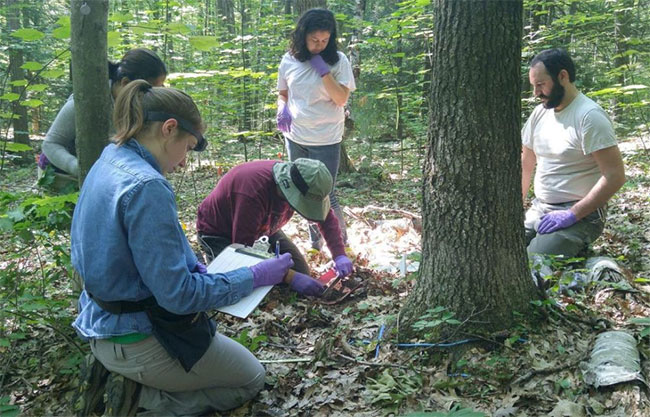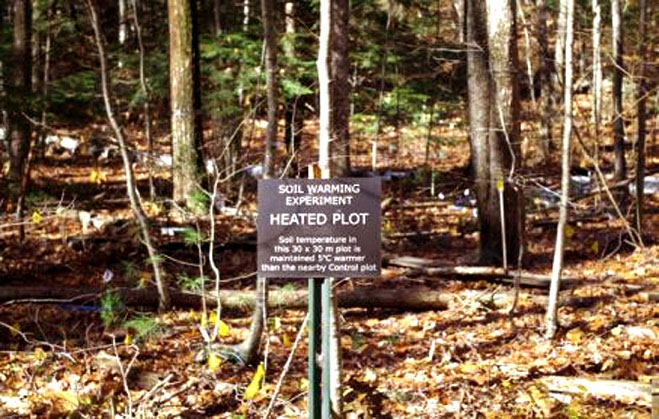Humans have mistakenly thought that the virus is a small creature
Until now, scientists still believe that viruses are smaller microorganisms. But since 15 years, the discovery of some large viruses has washed away this 'dogma'.
Recently, researchers have discovered a number of giant viruses in Harvard forest, a forest of up to 1,200 hectares owned by Harvard University to serve research projects of the this.

Biologist Frederik Schulz (red shirt) is taking samples in Harvard forest.
The original purpose of this group of scientists from the University of Massachusetts and the California Genetic Institute, is really to study how bacteria work to adapt to climate change, but what is surprising is that they are Discover a series of giant viruses.
While performing the meta-genome analysis of the samples, out of 2,000 sequenced particles, large-sized viruses such as bacteria appeared, with a specific number of 16, of more than 0 size. , 2 microns.
The first special thing, this is the first time that science has discovered a giant virus in the soil , because it was only found in water. One of these viruses was named HyperionVirus , meaning 'super-large virus' , to ' honor the world's tallest sequoia tree (115m). The HyperionVirus genome is one of the most important genomes ever identified.
And the second special feature, every detected virus has a different structure.
According to one of the researchers' biologists, Frederik Schulz, the number of viruses detected could be more, even three, four times more if digging in many places, because in this study they were Only digging has a location. And he concluded, the land here is a huge virus.

A Harvard forest notice board tells about global warming and its impact on soil microbial diversity.(photo by Jeff Blanchard).
Each species of virus discovered, according to scientific regulations, is named. And interestingly, every name has meaning from the origin of the discovery. Like the Dasovirus , the prefix 'daso' in ancient Greek means 'forest'. Or as Solumvirus, 'solum' in Latin means land. Another species is named Harvestovirus, due to being 'harvested ' in Harvard's territory .
Another biologist in the research group, Tanja Woyke, told Nature: 'Entering the sequence depth of these giant viruses in the soil is revolutionizing our understanding of the The terrestrial ecosystem is extremely important with lots of interesting things from the microorganisms. Currently our research data shows that many pieces are still missing. '
- The information you can mistakenly believe
- The virus that causes fetal brain atrophy is at risk of spreading throughout the Americas
- Sputnik - the virus shocked the entire world of scientific research by signing up ... another virus
- Common questions when Zika virus spread in Saigon
- The 'monster' species grows back to its head, turning prey into water
- Fluttering before the images of the mysterious
- Why do humans not erase mosquitoes?
- Dangerous virus attacking seals can spread to humans
- Announcing new testing methods for Zika virus detection in 20 minutes
- Alarm to spread bird flu from cats to humans
- Every country is afraid of Zika but Russians are not, they are more afraid of the flu
- Modified H5N1 virus can spread from pigs to humans
 Why do potatoes have eyes?
Why do potatoes have eyes? 'Tragedy' the world's largest carnivorous life: Death becomes ... public toilet
'Tragedy' the world's largest carnivorous life: Death becomes ... public toilet Tomatoes were once considered 'poisonous' for 200 years
Tomatoes were once considered 'poisonous' for 200 years Detecting microscopic parasites on human face
Detecting microscopic parasites on human face